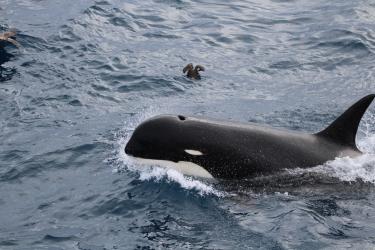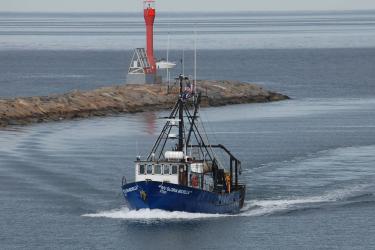We continue our series to introduce the people who work at the Northeast Fisheries Science Center. Each month we feature a new "face" from the Center's five laboratories and share with you a bit about who they are, what they do at the Center, and what they enjoy doing in their spare time.
Where did you grow up?

I am the middle child of five who grew up on a small subsistence farm in Rehoboth, Massachusetts. We raised lambs, goats, pigs, turkeys, chickens, ducks, and rabbits. In the summer we grew and harvested vegetables such as carrots, cucumbers, potatoes, tomatoes, green beans, peas, beets, zucchini, squash, popcorn, and herbs. I learned responsibility and independence at an early age, but looking back at the memories I wouldn’t trade it for anything. The animals were fed and watered twice a day, early in the morning before school and in the afternoon after school. In the winter when the hose would freeze we would carry 5-gallon buckets of water to the animals to give them fresh water. My favorite times were the long winter nights during lambing season helping the mother sheep give birth. We would give her warm molasses water to drink after birthing to give her a sugar boost. Then we would watch the lambs stand up on wobbly legs and learn to walk and nurse within hours of birth!
We also had many pets, including dogs, cats, parakeets, a cockatoo, chameleons, hamsters, guinea pigs, a pot belly pig, and even a rescued grackle. My favorite was my pet parakeet, Sky, who would sit on my shoulder every day while I did my homework. My parents are avid recreational fishers and when we were little they would take us fishing in freshwater ponds. As we got older they bought a boat and would take my siblings and me fluke fishing off Newport, Rhode Island, every summer. That’s my dad’s lucky fishing spot.
Where did you go to school and what subject did you get your degree(s) in?
I followed in my older sister's footsteps and attended Bristol County Agricultural High School, or what we called “Bristol Aggie.” That’s where my interest in a career in wildlife and fisheries conservation began. I majored in arboriculture so I spent a decent amount of time outside. The school curriculum included lots of hands-on experiences in the field learning about natural resources, which fostered my appreciation and later passion for conservation. Upon graduating, I went on to the University of Massachusetts, Amherst. I earned both my bachelor’s and master’s degrees in wildlife and fisheries conservation. As an undergraduate student, I was involved in two projects as a Tibor T. Polgar fellow using passive acoustics in the Hudson River. Passive acoustics use special equipment to listen to sounds underwater. The main goal was to collect underwater sound data to see if passive acoustics could be used to identify what kinds of sound-producing fish are present.
My master's research focused on better understanding haddock reproduction using passive acoustics, and macroscopic and microscopic evaluation of haddock ovaries. My goals were to:
Develop a maturation index for female haddock to improve collection of reproductive stage data in the field.
Validate that there is a correlation between spawning activity and courtship calls.
Determine if there is a precise time of day during which haddock spawn.
My graduate thesis work was important because it contributed to knowledge of the early life history and recruitment variability of haddock. Fisheries managers need this information to improve parameters used in stock assessment models.
How did you come to work at the Northeast Fisheries Science Center?
During my college years I volunteered on the Science Center’s fall and winter bottom trawl surveys. I worked on the NOAA Ship Albatross IV and on the clam survey on NOAA Ship Delaware II to broaden my exposure to different species and field sampling. It was a highly educational experience. I enjoyed spending days on the beautiful ocean learning about all aspects of fish biology. In fact, I enjoyed it so much that I started working part-time as a contractor, helping out where I could on surveys. This introduced me to some of the people and science at the Science Center. I started looking for full-time jobs while writing my thesis in 2007. Several contractor positions were open at the Center, so I applied and was hired. The rest is history!
What do you do at the Science Center?
In the 12 years that I have been at the Science Center I have worked in the Cooperative Research Branch. My experiences have included:
Spending time at the docks interacting with the fishing industry to organize deployment of equipment.
Training and routine troubleshooting in support of the Study Fleet program.
Developing, coordinating, and tracking research activities.
Providing administrative support for projects. This involves assisting with the management of databases and interfaces to facilitate the electronic collection and real-time submittal of fisheries-dependent data onboard commercial fishing vessels.
I assist with the development of the fisheries-dependent data collection tool Fisheries Logbook Data Recording Software. I process data requests ensuring the security, integrity, and availability of data. I develop research-related permit applications including the exempted fishing permit that supports the Branch’s biological sampling program.
In April 2019, I started providing logistical support for the Northeast Trawl Advisory Panel. This is a joint advisory panel set up in 2017 by the New England and Mid-Atlantic Fishery Management Councils. It is composed of Council members, commercial fishermen, academic, government, and non-government fisheries experts who provide advice and direction on the conduct of trawl research. I provide support for meetings. I love being a part of the panel. It’s wonderful to see experts from all facets of the industry come together and identify concerns, then collaborate to find ways to address or mitigate those concerns. The panel has been successful at generating mutual understanding and acceptance of problems as well as results of the work.
I’m also active in our Narragansett Laboratory’s house committee. That’s a small group of staff that coordinates social events such as our seasonal picnics and annual holiday gatherings.
What you like most about your position?
There are a lot of aspects of my job that I like. One priceless aspect is the collaborative nature of the work. I’m not only part of a cooperative research team, but also work collaboratively across the Science Center and with industry partners. Another great aspect of my job is that I work in a lot of different areas including administrative, project management, data management, and outreach. It allows me to switch what I’m working on, keeping each day’s work interesting. It helps the days go by quickly. At the end of the day what's most important to me is that the work I do in some way contributes to sustainable fisheries.
What are some of your hobbies?

When I am not at work, I am primarily busy with my three kids, Isaac (6), Ellie (4), and Anna (3), and my husband Nick. We also have a Rhodesian ridgeback dog, Winnie, and a cat named Lady. Our favorite thing to do as a family is to go to South Shore Beach in Little Compton, Rhode Island. We grab an ice cream at Gray’s Ice Cream in Tiverton afterwards. We have a large family reunion in Little Compton that we look forward to every summer, where we spend 1-2 weeks vacationing with extended family. I also enjoy Pilates, painting, puzzles, and following the New England Patriots and Boston Red Sox.
For more information, please contact Heather Soulen.



